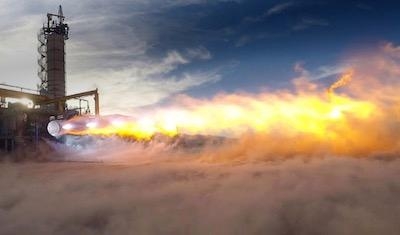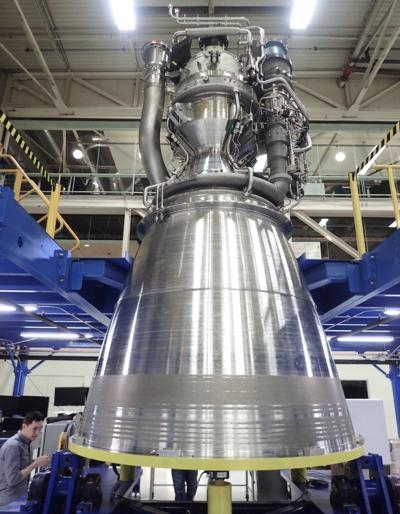BE-4 and After
A Blue Origin BE-4 rocket engine exploded during a 30 June 2023 test firing at the company’s West-Texas facility. The detonation destroyed the engine and substantially damaged test-stand infrastructure. Moreover, the setback’s ramifications are at once consequential to the extraterrestrial aspirations of Blue Origin and its customers.

The eradicated BE-4 was to have concluded testing in July prior to being handed over to United Launch Alliance (ULA), which was to have plied the engine to the attempted second launch of its Vulcan Centaur rocket.
In an 11 July statement, a Blue Origin spokesperson confirmed the company “ran into an issue while testing Vulcan’s Flight Engine 3.” The spokesperson added: “No personnel were injured and we are currently assessing root cause. We already have proximate cause and are working on remedial actions.”
The Blue Origin spokesperson further asserted ULA had been made “immediately” aware of the incident.
A joint-venture of Lockheed-Martin Space and Boeing Defense, Space, and Security, ULA competes primarily with Elon Musk’s SpaceX for the lion’s share of lucrative NASA and U.S. military space-launch contracts.
Blue Origin made clear it will “continue testing” rocket engines at its West-Texas facility as the company had perspicaciously built two test-stands.
“We will be able to meet our engine delivery commitments this year and stay ahead of our customer’s launch needs,” Beezos’s boffins averred.
The destruction of the BE-4 engine further stays the already extensively-delayed inaugural spaceflight of ULA’s Vulcan Centaur rocket—a two-stage heavy-lift launch vehicle powered by a pair of BE-4 engines and intended to meet the launch demands of the U.S. government's National Security Space Launch (NSSL) program—an initiative by which the United States Space Force and select U.S. intelligence agencies will be afforded broader license to conduct space-launches.

On 07 June 2023, ULA conducted a successful Flight Readiness Firing (FRF) of its Vulcan-Centaur core stage, thereby marking an important milestone along the tortuous and ongoing road to the Cert-1 mission—the first launch of ULA’s Vulcan Centaur rocket. The undertaking was closely monitored by ULA teams at Space Launch Complex (SLC)-41 of Florida’s Cape Canaveral Space Force Station. The Flight Readiness Firing demonstrated day-of-launch timelines and procedures, propellant loading competency, and a full countdown protocol. The exercise culminated in a six-second ignition, ramp-up, stable period of thrust, and controlled shutdown of two Blue Origin BE-4 engines.
Speaking to the subject of the BE-4 engine’s destruction, a ULA spokesperson set forth: “The BE-4 testing issue is not expected to impact our plans for the Vulcan Cert-1 mission.” The spokesperson noted the engines by which the Cert-1 mission is to be powered had previously “successfully passed acceptance testing” and are approved to launch.
As the Cert-1 mission appellation implies, completion of the U.S. Space Force’s certification protocol is contingent upon two successful launches of the Vulcan Centaur rocket. As ULA is set to retire its legacy Atlas V and Delta IV Heavy platforms, the timely certification of the Vulcan launch vehicle is a matter of paramount importance to ULA, its employees, and shareholders.
In June 2023, the U.S. Space Force tasked SpaceX and ULA with six missions apiece under the National Security Space Launch (NSSL) Phase-2 program. The entirety of ULA’s half-dozen NSSL missions are predicated upon the nominal function and timely certification of Blue Origin’s BE-4 rocket engine.
 ANN's Daily Aero-Term (05.16.24): Instrument Runway
ANN's Daily Aero-Term (05.16.24): Instrument Runway ANN's Daily Aero-Linx (05.16.24)
ANN's Daily Aero-Linx (05.16.24) Airborne 05.15.24: Ghost Sq MidAir, B-2 Junked, Dream Chaser Readies
Airborne 05.15.24: Ghost Sq MidAir, B-2 Junked, Dream Chaser Readies Airborne 05.10.24: Icon Auction, Drunk MedEvac Pilot, Bell ALFA
Airborne 05.10.24: Icon Auction, Drunk MedEvac Pilot, Bell ALFA Airborne Affordable Flyers 05.16.24: PRA Runway, Wag-Aero Sold, Young Eagles
Airborne Affordable Flyers 05.16.24: PRA Runway, Wag-Aero Sold, Young Eagles




